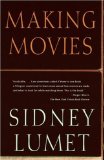
Making Movies
Sidney Lumet
Overview
The award-winning director covers all aspects of making films, from script to screen and everything in between. Covers scripts, actors, art direction, cameras, style, editing, music and more. Filled with great insights and anecdotes.
Notes
Having decided, for whatever reason, to do a movie, I return to that all-encompassing, critical discussion: What is the movie about? Work can't begin until its limits are defined, and this is the first step in that process. It becomes the riverbed into which all subsequent decisions will be channeled.
On Long Day's Journey Into Night:
Sometimes a subject comes along, and as in this case, is expressed in such great writing, is so enormous, so all-encompassing, that no single theme can define it. Trying to pin it down limits something that should have no limits. I am very lucky to have had a text of that magnitude in my career.
You and I may disagree about the meaning of a particular piece. That's not important. The important thing is that the interpretation by the director be committed enough so that his intention, his point of view, is clear. Each person is then free to agree, reject, or be awakened to his or her own feelings about the piece. We're not out for consensus here. We're out for communication. And sometimes we even get consensus.
What leads me to say "Print" is instinctive. Sometimes I feel it was a perfect take, sometimes because it's getting worse with each take, sometimes there's no choice. You've run out of light and have to move on.
They made Long Day's Journey Into Night because they all loved the material. He and the actors formed a coop and worked for the same minimum salary. Then they split profits.
Actors are very willing to go along if they love the material and everyone else is going along on the same basis.
I rehearse a minimum of two weeks, sometimes three, depending on the complexity of the characters.
It's all in the preparation. Do mountains of preparation kill spontaneity? Absolutely not. I've found that it's just the opposite. When you know what you're doing, you feel much freer to improvise.
Preparation allows the "lucky accident" that we're always hoping for.
In Dog Day Afternoon because everyone knew what they were doing, almost all the improvisation ended up in the finished movie.
I come from the theater. There, the writer's work is sacred. Carrying out the writer's intention is the primary objective of the entire production. The word "intention" is used in the sense of expressing the writer's reason for having written the play.
I was brought up with the concept that the one who had the initial idea, who suffered through the agony of getting it down on paper, was the one who had to be satisfied.
Questions he asks the screenwriter when considering a script:
What is this story about? What did you see? What was your intention? Ideally, if we do this well, what do you hope the audience will feel, think, sense? In what mood do you want them to leave the theater?
On discussing the intention of a screenplay with a writer:
Under the best of circumstances, what will emerge is a third intention, which neither of us saw at the beginning. Under the worst of circumstances, an agonizing process of cross-purposes can occur, which will result in something aimless, muddy or just plain bad.
Arthur Miller on losing control when he turned over a written work to be produced:
He said that he loved seeing what his work evoked in others. The results could contain revelations, feelings, and ideas that he never knew existed when he wrote the play. It's what we all hope for.
After agreeing on what the film is about with the screenwriter, Lumet will go into greater detail:
First comes an examination of each scene - in sequence, of course. Does this scene contribute to the overall theme> How? Does it contribute to the story line? To character? Is the story line moving in an ever increasing arc of tension or drama? In the case of a comedy, is it getting funnier? Is the story being moved forward by the characters? In a good drama, the line where the characters and story blend should be indiscernible.
